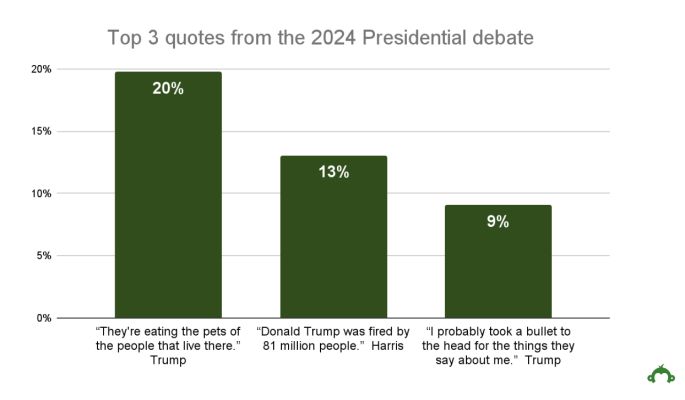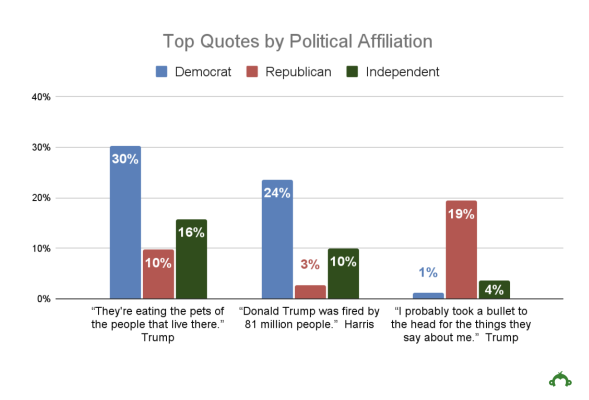Over the past decade, political debates have shifted from civilized conversations and constructive discourse to events that favor soundbites over substance. You’re more likely to hear a catchy one-liner than deeper discussions around economic policy, healthcare, and global relations.
Entertaining? Sure, but how much do these debates actually impact public opinion? And, what factors—beyond what’s said on stage—have an influence beyond what we see live?
To better understand reactions to the presidential debate in this new era, we ran a study on September 11, 2024 among 3,737 people in the US who watched or followed the Trump-Harris presidential debate. In our survey, we asked respondents what stood out, how they got their information, and what influenced them the most. Here’s what we learned.
Reactions to the presidential debate, celebrity endorsements, and memes
We asked viewers what would have the biggest influence on the election: the debate itself, Taylor Swift’s endorsement of Kamala Harris, or neither. Almost half (46%) chose neither.
However it's worth noting that over a third (35%) of viewers said the debate would have an influence on the election. This number might have gotten a lift from the recent impact of the last presidential debate, when Joe Biden stepped out as a candidate after a poor performance.
The impact of Taylor Swift was in the double digits, with 17% of viewers saying the pop star’s endorsement on Instagram will have an influence on the election. People who watched the debate via memes or video clips were more likely to be influenced by Swift, with almost a quarter (24%) saying they felt her endorsement would make a difference in the election.
Media choice and presidential debate quotes
The adage, “people hear what they want to hear,” holds true for debates, but there’s more to it than that. A growing number of media options complicates how people consume their news, and the fact that many outlets filter the news is hinted at in our study.
The top three soundbites of the debate were clear takeaways, with the most remembered statement of the night being Trump’s quote about immigrants "eating dogs and cats" in Ohio.

Republican vs Democrat debate reactions
When looked at the same data by party affiliation, we found people were largely aligned with the best quote from their party’s candidate--or the worst from the opposing candidate. Almost a third of Democrats (30%) rated Trump’s pet-eating quote as a top statement, while almost 20X the number of Republicans (19%) vs. Democrats (1%) said Trump’s “bullet to the head” quote was a key takeaway. About 8X the number of Democrats (24%) said Harris’ “Trump was fired” statement was a top quote compared to Republicans (3%).

There were also big distinctions based on how people watched the debate. We compared top quotes by media channel, including ABC News, the official debate network, with the conservative-leaning (Fox News) and liberal-leaning (CNN) channels, as well as shared memes and clips.
People watching CNN were 3X more likely to remember the Trump “pets” quote as a standout compared to Fox viewers. Fox viewers were over 10X as likely to remember the Trump “bullet” quote than CNN viewers. Viewers of memes and clips were somewhat in the middle, but most closely aligned with ABC, the debate sponsor.

Viewer demographics drive unique perspectives
Generational and gender distinctions continue to show significant impact in how the public views this election. We looked at the same questions around influence and top quotes through the lens of gender and age.
The large majority (84%) of viewers watched the debate on live TV or streaming, while 12% watched it on social media. As far as generational breakdowns, 81% of Millennials, 85% of Gen X, and 88% of Boomer viewers vastly preferred TV.
Gen Z breaks that pattern. Over twice as many, or 26%, of Gen Z tuned into the debate via social media compared to other generations, with 74% watching live or streaming TV.
Perhaps because of their focus on social media, Gen Z was also more influenced by Taylor Swift’s endorsement of Kamala Harris. According to our survey, 24% of Gen Z viewers believe the pop star’s endorsement will have an impact on the election, compared to 18% of Millennials, 13% for Gen Xers, and 15% of Boomers.
Women were also more likely to be influenced by Taylor Swift’s endorsement, with 19% of women views believing it will have an impact on the election, compared to 15% of men.
Have questions you want answered? Start your own survey, now.
Methodology: This SurveyMonkey study was conducted September 11, 2024 among a sample of 3,737 respondents who self-identified as having watched or followed the presidential debate between Donald Trump and Kamala Harris on September 10, 2024. Respondents for this survey were selected from a non-probability online panel. The modeled error estimate for this survey is plus or minus 1.0 percentage point. Data have been weighted for age, race, sex, education, and geography using the Census Bureau’s American Community Survey to reflect the overall demographic composition of the United States.



